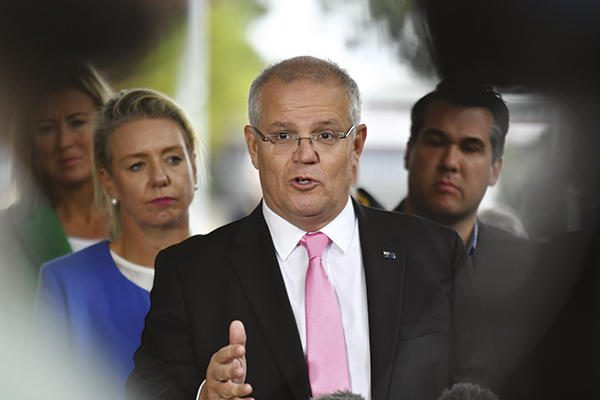The Catholic Church in Australia, still reeling from the Royal Commission into clerical child abuse in the Church and the jailing of Cardinal George Pell, has kept a noticeably low profile in the run-up to the federal election that takes place today, 18 May.
In a statement, “Politics in service of peace”, issued on 17 April, the bishops signalled support for “the vulnerable and marginalised, the unborn and older people, those seeking asylum, action on climate change”. They also rejected “unacceptable” differences in health, education and employment outcomes between Indigenous and non-Indigenous Australians. There was little subsequent engagement with the thorny questions about gay marriage, free speech and religious freedom that the party leaders encountered as they criss-crossed the country in pursuit of votes.
This week, Liberal Prime Minister Scott Morrison (inset) brushed aside questions about whether his personal views on same-sex marriage had changed since he vocally opposed it during Australia’s controversial same-sex marriage plebiscite almost two years ago. “I support the law of the country. I don’t mix my religion with politics and my faith with politics,” Mr Morrison, a Pentecostal Christian, said.
Mr Morrison and Labor Opposition leader Bill Shorten, raised a Catholic but now an Anglican, both received letters from the Presbyterian, Baptist, Seventh-Day Adventist and Apostolic churches, and from a number of religious school leaders, calling for protection of religious belief and free speech. The Catholic Church did not send a letter.
The letter asked Mr Shorten to clarify Labor’s official support for “appropriate protection of the religious freedom of all people”.
“This commitment leaves wide scope for interpretation, and much will turn on what is considered ‘appropriate’ in the eyes of a legislator,” the letter stated, adding:“We are concerned that these commitments lack sufficient particularity on key issues that are important to the preservation of the freedoms of religion, conscience, speech and association in our country.” Mr Morrison told an election debate at the National Press Club in Canberra on 8 May: “If you are not free to believe, what are you free to do in this country?” Mr Shorten offered a similar line. “People should be free to practise their religion,” he said.
16 May 2019, The Tablet
Bishops keep low profile in run-up to election

 Loading ...
Loading ...
Get Instant Access
Subscribe to The Tablet for just £7.99
Subscribe today to take advantage of our introductory offers and enjoy 30 days' access for just £7.99

